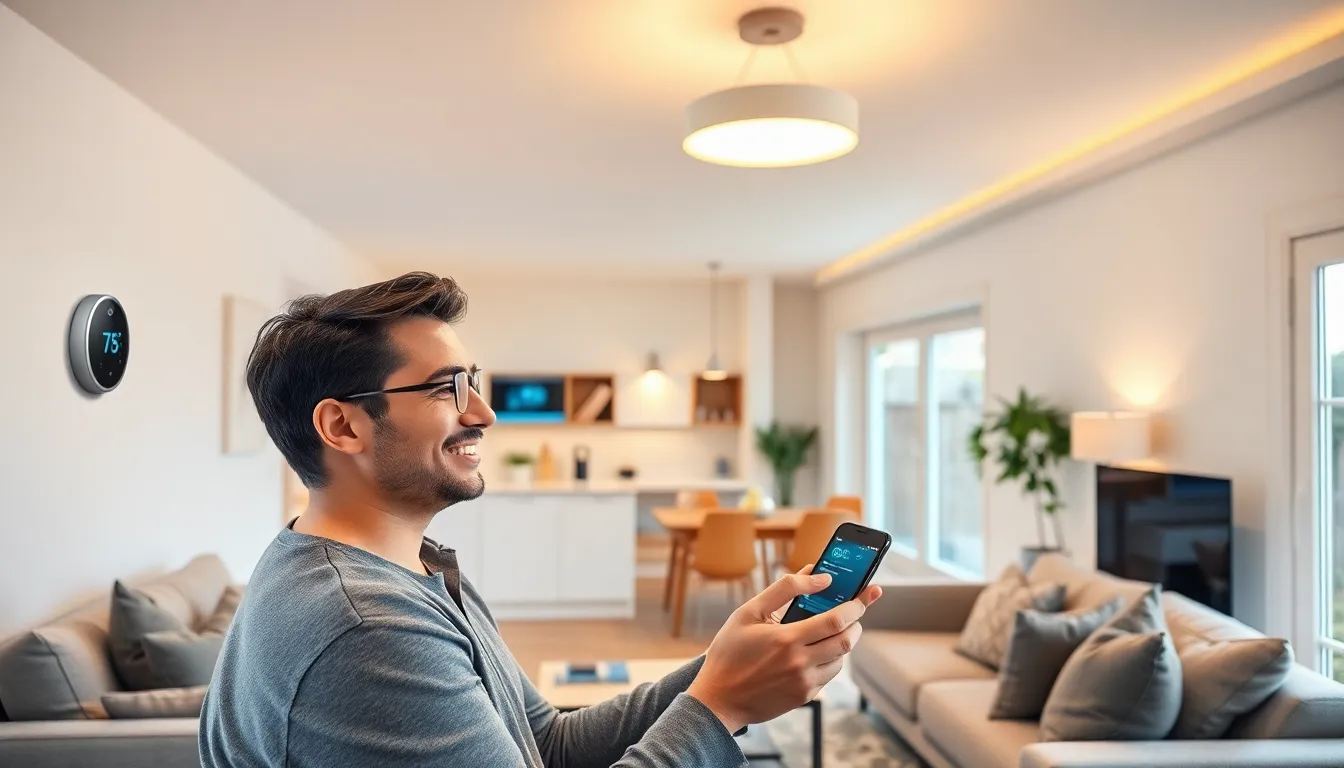In a world where even your toaster can be smarter than your average bear, home technology solutions are no longer just a luxury—they’re a necessity. Imagine controlling your lights, thermostat, and even your coffee maker with a simple voice command. It’s like living in a sci-fi movie, minus the flying cars and questionable fashion choices.
Home tech isn’t just about convenience; it’s about transforming everyday life into something a bit more extraordinary. With the right gadgets, he can turn his home into a smart sanctuary that saves time and energy. So why not embrace the future? After all, who wouldn’t want a home that can remind them to water the plants while also keeping an eye on the kids? Get ready to explore the latest innovations that’ll make life easier, funnier, and just a little bit cooler.
Table of Contents
ToggleOverview Of Home Technology Solutions
Home technology solutions encompass a wide range of smart devices designed to improve comfort and efficiency. Devices include smart thermostats, security cameras, voice-controlled assistants, and lighting systems. These solutions offer users the ability to manage home systems remotely, often via smartphone apps.
Smart thermostats adjust heating and cooling based on user habits, leading to energy savings. Home security cameras provide peace of mind by allowing homeowners to monitor their property in real time. Voice-controlled assistants streamline tasks through simple vocal commands, promoting a hands-free experience.
Lighting solutions can be programmed for mood settings, enhancing the living space’s ambiance. Smart appliances such as refrigerators, ovens, and washing machines now offer connectivity features that allow for remote monitoring and control. Each of these technologies contributes to a more integrated home environment.
Home automation systems enable seamless communication between devices, creating an interconnected ecosystem. Users can set schedules for devices, ensuring everything functions according to their preferences. Integration with wireless networks has made controlling multiple devices easier.
For energy efficiency, smart plugs and energy monitors help track usage and suggest improvements. Enhanced convenience is evident with automated routines that simplify daily tasks. Overall, home technology solutions create an ecosystem that promotes both utility and enjoyment in living spaces.
Types Of Home Technology Solutions

Home technology solutions encompass a wide range of devices and systems designed to enhance comfort, security, and efficiency in living spaces.
Smart Home Devices
Smart home devices include a variety of gadgets that streamline daily tasks. These devices, such as smart thermostats and smart lighting systems, allow users to control settings remotely through smartphone apps. Voice-controlled assistants enable hands-free management of various home functions, making daily routines easier and more enjoyable. Smart appliances offer connectivity, allowing for real-time monitoring and control, resulting in optimal energy use. These innovations contribute to a more sustainable lifestyle while keeping homes comfortable.
Home Automation Systems
Home automation systems integrate multiple devices to create a cohesive living environment. These systems facilitate communication between various smart devices, allowing for personalized routines and schedules. Through automation, users can set scenes or activities, such as dimming lights for movie night or adjusting temperatures based on occupancy. Programming home systems to work together not only enhances convenience but also improves energy efficiency. Smart hubs serve as central controllers, allowing seamless management of all connected devices.
Security Solutions
Security solutions play a vital role in ensuring home safety. Smart security cameras provide real-time monitoring and alerts, allowing for immediate response to any unusual activity. Motion detectors can be integrated with other devices to automate actions such as lighting systems turning on when motion is detected. Additionally, smart locks enable keyless entry and remote access, enhancing physical security. Comprehensive security systems offer peace of mind, knowing that homes are protected at all times. Access to security features via mobile apps further empowers homeowners to stay connected and informed.
Benefits Of Home Technology Solutions
Home technology solutions provide substantial advantages that enhance daily life. These innovations contribute to convenience, security, and energy efficiency.
Increased Convenience
Smart devices enable effortless control of home environments. Users can operate lights, thermostats, and appliances through voice commands or mobile apps. Daily routines seem to flow more smoothly, thanks to automation features. Personalization makes it easy for homeowners to adjust settings for individual preferences. Tasks like setting reminders or controlling entertainment systems become simpler, enhancing leisure time. With the integration of multiple devices, managing home functions turns into a seamless experience.
Enhanced Security
Enhanced security features significantly improve peace of mind for homeowners. Smart cameras and door locks provide real-time monitoring and notifications, allowing for instant updates on home activity. Users gain remote access to view live footage or control locks from anywhere. Alerts for unusual movements or entries keep residents informed and proactive. Comprehensive security systems integrate seamlessly with home automation, creating a cohesive protective environment. Increased monitoring capabilities make homes safer and reduce the risk of theft or intrusion.
Energy Efficiency
Energy efficiency becomes a key benefit of adopting home technology solutions. Smart thermostats adapt to daily routines, optimizing heating and cooling schedules based on occupancy. Additionally, smart lighting systems automatically adjust brightness, decreasing energy consumption. Data from energy monitors provides insights, allowing users to identify high consumption patterns. These efficiencies lead to lower utility bills and a positive environmental impact. Integrating energy management features promotes sustainable living while maintaining comfort and convenience.
Challenges And Considerations
Adopting home technology solutions presents challenges that users must navigate. These challenges often include cost implications and privacy concerns.
Cost Implications
Costs vary significantly when investing in home technology. Initial expenses include purchasing devices and installation. Smart devices can range from $50 to over $500. Maintaining these devices also incurs ongoing costs for subscriptions or service plans. Energy savings offset some expenses, leading to lower utility bills over time. Overall, budgeting for both upfront and long-term costs remains crucial for homeowners.
Privacy Concerns
Privacy concerns arise with increased connectivity in smart homes. Many devices collect data to optimize performance, raising questions about how this information is stored and used. Smart speakers and cameras can be potential targets for hacking if proper security measures aren’t in place. Users must understand privacy settings and regularly update software. Taking proactive steps strengthens protection against data breaches and enhances user confidence.
Future Trends In Home Technology Solutions
Innovations in home technology solutions continually reshape how people interact with their living spaces. Smart home integration becomes increasingly prevalent, with devices designed to communicate seamlessly. Transparency in connectivity features enhances user experience, ensuring that homeowners can monitor their environment effectively.
Voice recognition technology evolves rapidly, allowing users to provide commands effortlessly. Enhanced AI algorithms improve response accuracy, leading to smoother interactions with smart devices. Homeowners can expect increased personalization, as systems learn individual preferences over time.
5G connectivity impacts home technology significantly. Faster bandwidth supports more devices simultaneously, enabling a comprehensive smart home ecosystem. This improvement encourages the use of bandwidth-heavy applications like streaming and video conferencing, all within the same environment.
Data security remains a crucial focus area. Manufacturers prioritize cybersecurity measures to safeguard user information and enhance trust in smart devices. Regular software updates help protect against potential threats, ensuring smoother operation and user confidence.
Sustainable energy solutions emerge as a key trend in home technology. Solar panels and battery storage systems are integrated into smart home designs, reducing dependence on traditional energy sources. Energy monitoring systems assist homeowners in tracking consumption, promoting more sustainable living choices.
Interoperability between devices also gains attention. Standards evolve to ensure that products from different manufacturers work together seamlessly. This development simplifies user experiences, allowing for unified control and operation of various devices.
Finally, augmented reality and virtual reality technologies are being integrated into home design and security. Homeowners can visualize changes to their space or monitor their property through immersive experiences. These advancements provide unique solutions that enhance comfort and security in homes.
Home technology solutions are revolutionizing the way people interact with their living spaces. By integrating smart devices and automation systems, homeowners can enjoy enhanced convenience and security while optimizing energy efficiency. These advancements not only simplify daily tasks but also create a more enjoyable environment.
As technology continues to evolve, embracing these innovations will become increasingly beneficial. Staying informed about the latest trends and best practices is essential for maximizing the advantages of home technology. With the right approach, anyone can transform their home into a smart haven that meets their unique needs and preferences.




